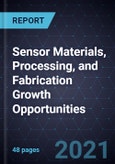Monolithic Integration and Self-Assembling Processes Drive Advancements in the Fabrication and the Processing of Sensors
The sensors market is expanding, and it is regarded as one of the most promising areas in the semiconductor industry. Sensor technology is an evolving discipline that holds the potential to significantly improve the performance, durability, maintenance, and applicability of many engineering projects. Material science and engineering advancements have opened up opportunities for the development of new and sophisticated sensors. Material selection is the first step in the sensor fabrication process. This is a critical technological decision with far-reaching implications for subsequent fabrication stages.
Both nanomanufacturing and nanofabrication are used in the development of 1D/2D/3D nanoparticles; they offer high operability and complex crystal structures and can be used in various applications such as healthcare, photonics, consumer electronics, and energy. Nanofabrication is the practice of incorporating small objects into larger objects to enable special functionalities such as the inclusion of graphene materials in sensor devices.
Key Questions Answered in this Technology and Innovation Study:
1. Which factors challenge growth? What are the important drivers and restraints to market growth?
2. What does the patent landscape look like?
3. What are some of the important funding trends in the market?
4. Which industry best practices are adopted in sensor fabrication?
5. What are the key growth opportunities in the market?
Table of Contents
1. Strategic Imperatives
1.1 The Strategic Imperative 8
1.2 The Impact of the Top Three Strategic Imperatives on the Sensor Materials, Processing, and Fabrication Industry
1.3 About the Growth Pipeline Engine
1.4 Growth Opportunities Fuel the Growth Pipeline Engine
2. Growth Environment
2.1 Scope of this Technology and Innovation Research Service
2.2 Research Methodology
2.3 Research Process and Methodology
2.4 Summary of Key Findings
3. Technology Snapshot
3.1 Sensor Fabrication and Processing Technology Overview
3.2 Graphene Sensors - Key Materials in the Sensor Fabrication Industry
3.3 CNTs - Enhancing the Sensor Fabrication Approach
3.4 Conducting Polymers - Unique Materials that Aid Sensor Fabrication
3.5 Emerging Sensor Fabrication Trends in Semiconductor Foundries
4. Factors Influencing Technology Development and Adoption
4.1 Growth Drivers
4.2 Growth Restraints
5. IP Innovation and Funding Trends
5.1 IoT-enabling Technologies Encourage Research in Sensor Fabrication
5.2 Industry Consortiums Encourage Funding across Supply Chains
5.3 Key Project Initiatives to Develop Sensors with Advanced Materials and Fabrication Methods
6. Companies to Action
6.1 CMOS-MEMS Fabrication Process
6.2 Silicon Sensor Fabrication and Production
6.3 Thin-film Deposition Technologies for Flexible Printed Sensor Applications
6.4 Thin-line Crystal Fabrication of Sensors
6.5 Fabrication of a Scalable CMOS-based SWIR Sensor
7. Growth Opportunity Universe
7.1 Growth Opportunity 1: Advancements in Monolithic-based Sensor Integration/Fabrication for High-performance Results
7.2 Growth Opportunity 2: Advanced System in Packaging (SiP)/Hybrid Sensor Integration for the Development of Next-generation Products
7.3 Growth Opportunity 3: Molecular Self-assembly in Nanofabrication for Volume-based Sensor Production
8. Key Contacts
9. Next Steps
9.1 Your Next Steps
9.2 Why Now?








